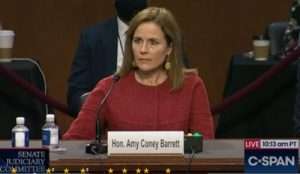The Volokh Conspiracy
Mostly law professors | Sometimes contrarian | Often libertarian | Always independent
A Qualified Defense of Supreme Court Confirmation Hearings
They have serious flaws, many of which are on display this week. But we are still better off with them than without them.

While there is deep disagreement about the merits of Amy Coney Barrett's nomination, commentators across the political spectrum seem united in decrying the confirmation hearings as ridiculous, a "circus," or even "verging on the absurd."
Like many other observers, I thought a lot of what was said in the hearings was lame. Senators from both parties engaged in worthless grandstanding, and many of the nominee's answers were evasive, at best. The same, I think, was often true of other recent SCOTUS nominees. And there was no shortage of dumb questions (such as this one by Sen. Lindsey Graham), and even ridiculous conspiracy-mongering.
My George Mason University colleague Adam White has a thoughtful Washington Post op ed outlining what confirmation hearings can potentially achieve. But even he likely realizes that the sordid reality is far from that ideal.
But, even if they remain largely as they are, the hearings serve useful purposes, despite their severe flaws. Requiring the nominee to run this gauntlet deters the nomination of cronies and hacks who aren't knowledgeable and smart enough to avoid looking like idiots on national TV, as well as those who lack basic knowledge of constitutional law issues. As White puts it, " the process deters palpably unqualified nominations. Presidents know they cannot nominate a judge who cannot convey a basic understanding of the law in response to senators' questions."
The confirmation process also creates opportunities for opposing party senators (and others) to dig for possible ethical and other flaws in the nominee's background. This too helps deter some of the worst potential nominees. And it's part of the reason why I oppose the rushing of the process undertaken by the GOP this case.
While few if any of the people nominated in recent years are ones I would have chosen if it were up to me, we could easily do much worse. The confirmation process - including the hearings - is part of what helps screen out worse nominees.
I have significant disagreements with, and reservations about, all of the justices confirmed during my professional lifetime. But all are highly capable jurists, and none have turned out to be simply crude minions of whichever president or party secured their appointment. In the cases of Neil Gorsuch and Sonia Sotomayor, they have even turned out to be significantly better in some respects than I expected at the time they were nominated.
In addition, the use of outside expert witnesses for and against the nominee allows those witnesses (and the senators) to call attention to important legal issues that otherwise might not get as much air time normally. I saw a small example of this myself, when I testified at then-Judge Sonia Sotomayor's confirmation hearing in 2009, becoming perhaps the first witness at such a hearing to focus on constitutional property rights issues. That I was the person testifying mattered very little. But it was notable that these important questions (eminent domain and asset forfeiture) got some national attention they might not otherwise have received. More recent confirmation hearings have featured insightful testimony on issues such as executive power, and the strengths and weaknesses of originalism and living constitutionalism.
Only a small minority of voters are likely to watch those parts of the hearings that feature outside witnesses (as opposed to the nominee herself). But that minority is still many more people than would pay attention to most such constitutional issues at other times.
And, while most of the questions and answers in confirmation hearings have little value, occasionally they do elicit some useful information. Just this week, Barrett's answers to various senators' questions provided some helpful insight on her likely approach to the Obamacare severability case currently before the Supreme Court.
Best of all, when I was a witness at the Sotomayor hearing in 2009, I got to meet former Cy Young-award winning major league pitcher David Cone (who was there to testify in support of Sotomayor, due to his involvement in the Major League Baseball Players Association, which was the winning party in one of her best-known rulings as a district judge). We had an interesting conversation about sabermetrics - the quantitative analysis of baseball performance and strategy. Contrary to the stereotype of professional athletes as dumb jocks who disdain anything "nerdy," Cone said he thought sabermetrics was extremely useful to players, and correctly predicted that the biggest future gains were likely to emerge from improvements in the analysis of defensive performance (which is less well measured than offense and pitching).
OK, perhaps my meeting with Cone isn't really much of a reason to keep confirmation hearings! But, as described above, the hearings can serve the public interest, as well as that of witnesses. As flawed as the current system is, abolishing the hearings would probably make things worse, rather than better.


Show Comments (20)